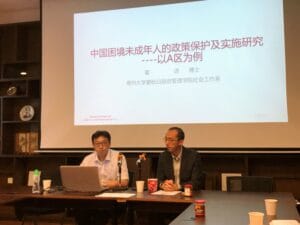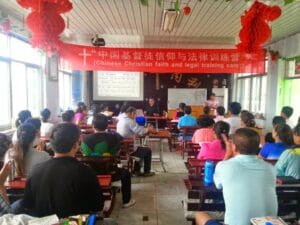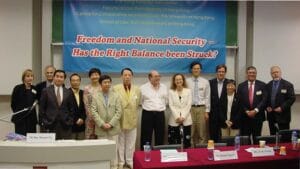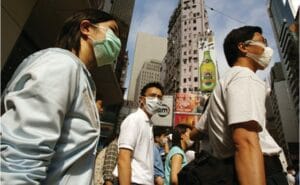EVENTS
Dui Hua Attends Seminar on Juvenile Justice and Social Work

On May 11, Dui Hua Hong Kong staff attended a seminar on juvenile justice and social work in China at the Chinese University of Hong Kong. Leading the seminar was Professor Zhai Jin, Head of the Social Work Department at Changzhou University in Jiangsu. The seminar introduced recent developments and trends in social work services for at-risk youth in China, including juveniles, migrant youth, and orphans. As a practicing social worker and academic, Zhai’s research was carried out in conjunction with the Ministry of Civil Affairs (MCA). Since 2013, the MCA has attempted to strengthen the availability of social work resources for at-risk youth. That year, the MCA released a Notice on the Launching of the Trial Implementation of the Social Protection for Minors. In 2016, the State Council released an Opinion on Strengthening Resources for At-Risk Youth.
The population Zhai serves includes not only juveniles but also orphans and migrant children, including “left behind” children. Unlike most of the youth who receive social work services from Zhai, the decision to provide social work services to juveniles was often a condition set by the courts responsible for releasing juveniles back into society. Consequently, many of the juveniles who had received social work services from Zhai were given treatment plans with defined end dates determined by the courts. Although a positive sign in that some courts recognize the importance of providing social work services for juveniles re-entering society, Zhai noted that in comparison to the treatment plans for other youth under his care, it was harder to make substantial progress with juveniles who had clear end dates and not always enough time to fully benefit from the services.
In 2012, China amended its Criminal Procedure Law to emphasize the principle of education first and punishment second in juvenile cases as well as the importance of considering social inquiry reports completed by social workers during sentencing. Since then, the use of non-custodial measures in juvenile cases has been on the rise. Zhai’s research raises a critical obstacle for juvenile justice reformers in China – the plight of migrant youth.
Juveniles, many of whom are migrants or left-behind children, face discrimination when it comes to access to non-custodial measures. Courts in cities and provinces with large migrant populations such as Shanghai and Guangdong have reported lower than average rates of juvenile non-custodial measures when compared to national averages. In both Shanghai and Guangdong, the courts have attributed this to the large number of migrant juveniles. There are a myriad of legal and economic barriers migrant juveniles face in obtaining non-custodial measures. For example, in some cities, police or other responsible bodies in charge of supervising juveniles serving a suspended sentence will not monitor juveniles who do not hold a local hukou. This loophole leaves many migrant juveniles ineligible for suspended sentences. Those who are lucky enough to get a suspended sentence may have to relocate to their hometowns, where they are less likely to receive adequate treatment plans as they are being supervised by those who lack familiarity with their cases and specific needs. Juvenile defendants in China are often able to serve suspended sentences if they “express remorse.” One way of expressing remorse includes returning stolen property or providing financial compensation, a system that clearly privileges wealthier defendants.
The plight of migrant youth in China’s justice system cannot be understated. Like many juvenile populations around the world, youth who come into conflict with the law in China are disproportionately of an economically and socially disadvantaged background. With the staggering number of migrant youth in China, Zhai’s research raises a critical obstacle for juvenile justice reformers. How do reformers create a justice system that ensures non-custodial measures are impartially applied to all defendants regardless of economic background, and ensure that courts routinely include the recommendations and services of social workers in determining sentences and facilitating the reentry of juveniles into society?
At Dui Hua’s 2017 juvenile justice exchange in Shenzhen, the issue of social inquiry reports was raised by several Chinese judges, who expressed concern that courts often lacked the resources for social workers to independently complete the reports. In cities where the juvenile population is overwhelmingly made up of migrant youths, such as Shenzhen, social workers and juvenile courts must work hand in hand. As Zhai’s research shows, the need for preventative mechanisms to support at-risk youth and rehabilitative services for youth offenders will only come about through cooperation between government and social service providers.
PRISONER UPDATE
Dui Hua has been informed that Chen Yulin, a Hong Kong resident and United Kingdom citizen, was granted a seven-month sentence reduction in April. Chen, a former official at Hong Kong’s Xinhua News Agency, was placed under residential surveillance on January 31, 2003. He was subsequently detained on March 13, 2003 and formally arrested on suspicion of espionage on April 17, 2003.
Chen was convicted of espionage by the Guangzhou Intermediate People’s Court on March 4, 2004 and sentenced to life in prison. The Guangdong High People’s Report rejected his appeal on August 29, 2004. He was sent to Shaoguan Prison to begin serving his sentence.
Because his alleged offense took place before the amended Criminal Law took effect in 1997, Chen Yuling was tried under the 1979 Criminal Law for the crime of counterrevolution.
Chen Yulin’s life sentence was commuted in 2007 and replaced with a fixed-term sentence of 19.5 years. Since then, Chen’s sentence has been reduced five times totaling 76 months. Following the most recent reduction, Chen is due for release on August 26, 2020.
In June, Dui Hua delved into records at an American university, uncovering previously unknown names of political and religious prisoners. Records included government reports and gazettes from courts, procuratorates, public security organs, and prisons from city and provincial levels. Valuable information on religious prisoners was found.
In a Gansu court record, Dui Hua discovered an incident leading to the arrest of more than thirty Almighty God members. On December 6, 2012, 32 members of the Almighty God group entered a busy area near a Huangqu Township government building in Dunhuang city to distribute religious texts and perform religious songs and dance. Key members included Zhao Mingxing, Gong Haizhong, Wang Yongzhi, Zhang Xuemei, Dang Xiaoying, and Feng Lihua. The Almighty God members clashed with police, attracting the attention of hundreds of onlookers and causing serious traffic. The police seized the materials brought by the members. The record states that the defendants were charged under Article 300, “organizing/using a cult to undermine implementation of the law” and received sentences ranging from one year to suspended sentences ranging from two to five years and six months. The defendants appealed. The Jiuquan Intermediate People’s Court upheld the judgment.
A Hebei public security record revealed the arrest of a group of Falun Gong practitioners and the seizure of Falun Gong materials. On May 12, 2004 police arrested a group of Falun Gong practitioners including Wang Jinyu, Su Kezhen, Wang Shouyu, Li Guanglian, and Hu Jicheng. Following their arrest and trial, the police cracked cases involving Falun Gong practitioners in Dongbao, Jidao, Shayang, and Dangyang City in Hebei Province. More than 5,000 Falun Gong propaganda materials were confiscated, as well as over 200 volumes of information and 100 discs. Twelve people involved in the cases were arrested. Several were given fixed-term sentences.
A Shandong record provided information on the crackdown on the Green Environment Protection Civic Party (The Green Party绿野环境保护公民党). According to an online judgment found in December 2017, The Green Party, a.k.a. the China Democracy and Justice Party (中国民主正义党) was established in 2013-2014. The leaders created an instant messaging group on QQ and posted articles attacking the CPC and attempted to set up a security personnel company to train party members. In November 2015, Deng X (邓某) was sentenced to four years’ imprisonment, and Qu X (曲某) was given a sentence of three years and six months. Both were sentenced for subversion.
In a Gansu provincial public security bureau record, Dui Hua staff discovered the name of previously unknown suspect in an endangering state security case. Abdukeyum Tursun (阿布杜凯尤木·图尔逊), was wanted by the Xinjiang Public Security Bureau for splittism, He was arrested in Gansu on March 13, 2008. Facts related to his incarceration and sentencing are not known.
PUBLICATIONS ROUND UP
Featured: “Illegal Business Activity” and Christian Bookstores (May 9, 2018)

Last month, the Chinese government banned online retailers from selling the Bible on their platforms. Within days after the ban was announced, ecommerce giants Taobao and JD.com had removed the Bible from its websites. In an officially atheist country where stories of religious oppression often make international headlines, many might be surprised to learn that the Bible is a bestseller.
Mixed Signals in Reports of “Zero Confession” Executions
Previous Digest: May 2018
IN THE MEDIA
Executive Director John Kamm discusses China’s “exit bans” in Daily Beast‘s “Beijing Is Holding U.S. Citizens ‘Hostage’ in China.” (August 18, 2018)
In an interview with Michigan NPR’s Stateside, Executive Director John Kamm commented on the injustice suffered by American citizen Wendell Brown who has been detained in China since September 2016 because of repeated delays in announcing the judgement. (June 20, 2018)
John Kamm Remembers
John Kamm Remembers is a feature that explores Kamm’s human rights advocacy prior to and since Dui Hua’s establishment in 1999
National Security in the Time of SARS (Part 1 of 2)

Shortly after Tibetan political prisoner Ngawang Sangdrol’s arrival in the United States on March 28, 2003, I began preparing for my next visit to Beijing and Hong Kong, tentatively scheduled for early June, roughly four weeks later. Preparations for these visits, then as of now, take many weeks.
Cases need to be identified, researched, and prioritized. Bilingual prisoner lists for my interlocutors have to be prepared. For this trip I intended to focus on the imprisoned American businessmen Jude Shao and Fong Fuming, as well as prominent Uyghur political prisoner Rebiya Kadeer.
I sought meetings with the Ministry of Foreign Affairs, the Ministry of Justice, the Supreme People’s Court, the Supreme People’s Procurement, and leading Chinese academics who served as advisers to the Chinese government. I asked to visit a prison. I asked for meetings with the American ambassador and other diplomats as well.
I made my preparations with some trepidation. A fatal disease – Severe Acute Respiratory Syndrome (SARS) – was sweeping China. Thousands of infections had been recorded, and many people – including officials – had been placed under quarantine. Guangdong Province was especially hard hit. By early June 2003, the province had recorded more than 1,500 cases and 57 fatalities. SARS had already spread to Beijing, Tianjin, and other provinces and municipalities by April. By early June, there were 5,329 cases and 336 reported deaths nation-wide.

The epidemic reached Hong Kong in March 2003. The first fatality was recorded on March 11. By early June, 1,750 cases had been identified and 286 deaths recorded. The city was in a state of high alert. Disinfectant was applied liberally to every conceivable surface, often several times a day. People wore masks and generally avoided public gatherings. Tourist arrivals dropped precipitously.
In mid-May I was advised that my principal interlocutor, Ministry of Foreign Affairs Director General of the International Department Li Baodong, remained under quarantine. All prisons in the country had been placed off limits to visitors. I decided to cancel my trip to Beijing but to proceed with the visit to Hong Kong. I would meet Chinese officials from an inland province as well as Hong Kong activists, academics, and researchers. As usual, I would conduct research at the University Services Center of the Chinese University of Hong Kong.
“Nest of Spies”
SARS was not the only issue troubling the people of Hong Kong during the early months of 2003. Article 23 of the Basic Law, Hong Kong’s mini-constitution, stated that the Hong Kong Special Administrative Region (SAR) “shall enact laws on its own to prohibit any act of treason, secession, sedition, subversion against the Central People’s Government.” This article had been inserted into the Basic Law after the events of May and June 1989 in Beijing.
By late 2002, the SAR’s Legislative Council (Legco) had failed to enact the legislation called for under Article 23, and Beijing was growing impatient. Chinese officials based in the SAR declared that Hong Kong was a nest of spies; in early 2003 at least three Hong Kong residents, all of whom had worked in China’s Xinhua News Agency, were detained in Guangdong Province for allegedly spying for the United Kingdom during the years leading up to the handover in 1997. They were eventually arrested, tried, and convicted of espionage. Two of them, Chen Yulin and Wei Pingyuan, were sentenced to life in prison. They were still in prison, despite multiple sentence reductions, as of mid-2018 (see this issue’s Prisoner Update).
The Hong Kong official tasked with pushing through Article 23 legislation by Chief Executive Tung Chee-hwa was Regina Ip, a career civil servant holding various positions in the Hong Kong government before being appointed Secretary for Security in July 1998. Ms. Ip and I had worked on retaining Most Favored Nation trading status for China in the early 1990s. I knew her as a tough, uncompromising official well versed in issues of trade, industry, and immigration. She had little knowledge of national security however, and had infrequently visited China before 1997 (when she was 47 years old). This was in line with pre-handover British policy which placed restrictions on Hong Kong officials traveling to the People’s Republic.
Regina Ip was also very ambitious. She was determined to eventually become the Chief Executive of the SAR.
Unfortunately for her ambitions, Secretary Ip had developed a reputation for alienating people by making ill-considered remarks. In the run-up to the introduction of the National Security Bill in the Legislative Council’s Bills Committee on February 14, 2003, Secretary Ip had warned against viewing democracy as a panacea. After all, she said, Adolf Hitler had been democratically elected as Germany’s chancellor before embarking on his murderous genocide directed at the Jews. She also disparaged Hong Kong’s taxi drivers and restaurant workers, opining that they weren’t interested in such things as national security.
A Letter from Alan Leong
I arrived in Hong Kong on June 11 and immediately went to the J.W. Marriott Hotel at Pacific Place on Hong Kong Island. After checking in, I went to my room to begin unpacking. While doing so, I noticed a letter that had been slipped under my door. It was from Alan Leong, a leading member of the Article 23 Concern Group and Chairman of the Hong Kong Bar Association. The letter, on Bar Association stationary, invited me to make a presentation to a conference on Article 23 to be held at the Law School of Hong Kong University on June 14-15, 2003. The title of the conference was “Freedom and National Security – Has the Right Balance Been Struck?” I was asked to make a presentation on national security legislation in the People’s Republic of China.
I called Mr. Leong at his Chambers. “What’s this all about?” I asked. “The policy governing Hong Kong is ‘One Country, Two Systems.’ What does national security legislation in China have to do with national security legislation in Hong Kong.” At that point I hadn’t even read the National Security Bill being considered by Legco.
Mr. Leong replied, “You are correct. National security legislation in China should have nothing to do with national security legislation in Hong Kong. As it turns out, however, the bill under consideration contains language which links the two systems. In short, if an organization in Hong Kong is subordinate to an organization in China that has been banned by the central government on national security grounds by means of a certificate, the Secretary for Security can ban it in Hong Kong.”
I was intrigued. I had never heard of a Mainland Chinese mechanism for banning an organization on national security grounds by means of a certificate. Prior to 1997, when China’s Criminal Law was amended to remove the crime of counterrevolution, individuals could be sentenced to prison for simply belonging to a counterrevolutionary group. Whether or not a group was a counterrevolutionary group was determined by a court, not by a government agency. After 1997, mere membership in a group no longer constituted a crime. This important 1997 reform of the Criminal Law sought to criminalize acts like drafting manifestos and raising money, not simple association.
I agreed to make a presentation on June 15, the second and last day of the conference. I was told by Mr. Leong that the audience would probably be small. June 15 was Father’s Day in Hong Kong, and mine would be among the last presentations.
After we rang off, I went to the hotel’s concierge level and printed out a copy of the National Security Bill. Part 4, Section 8A (2) (c) provided for the Secretary for Security to proscribe any local organization “which is subordinate to a mainland organization the operation of which has been prohibited on the ground of protecting the security of the People’s Republic of China, as officially proclaimed by means of an open decree, by the Central Authorities under the law of the People’s Republic of China.” The next section (3) stated that conclusive evidence of the prohibition would be “a certificate issued by or on behalf of the Central People’s Government.”
I began preparing a presentation based on points of Chinese law, and on cases of individuals tried by Chinese courts for counterrevolution and endangering state security.
Read part 2 here.
